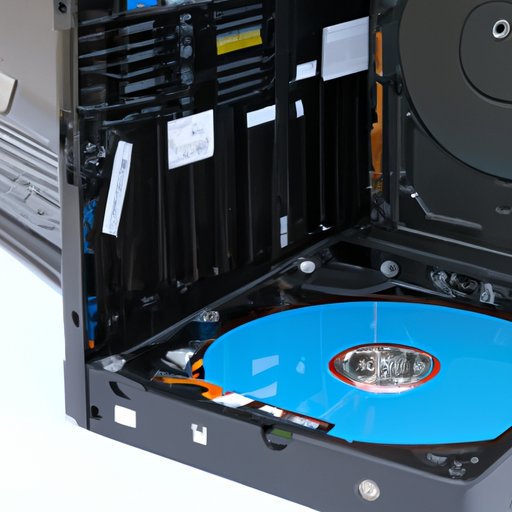
I. Introduction
Is your computer running slow or out of storage space? If so, don’t despair! There are several ways to clear up space on your PC and improve its performance. In this article, we’ll provide a complete guide on how to free up space on your PC, including step-by-step instructions, explanations, and tips.
You can choose from a variety of methods to free up storage. Some of these include uninstalling unnecessary programs, deleting temporary files, cleaning the Recycle Bin, using Disk Cleanup, disabling hibernation, and moving files to external storage.
II. Uninstall Unnecessary Programs
One of the easiest ways to free up space on your PC is to uninstall programs that you no longer need or use. These programs may take up a lot of storage space, and removing them can be a quick and simple solution.
To uninstall a program, follow these steps:
- Open the Control Panel. You can do this by searching for it in the Start menu.
- Click “Programs and Features.”
- Select the program you want to remove, and then click “Uninstall.”
- Follow the prompts to complete the uninstallation process.
By doing this, you can free up a significant amount of space on your PC. Depending on the size of the programs you remove, you may recover several gigabytes of storage space.
III. Delete Temporary Files
Temporary files are files that are created and used by various programs on your PC. They are meant to provide temporary storage, but over time, they can accumulate and take up a significant amount of space on your computer.
To find and delete temporary files, follow these steps:
- Press the Windows key and the R key at the same time to open the Run dialog box.
- Type “%temp%” (without the quotes), and then click “OK.”
- Select all the files in the folder, and then press the Delete key to remove them.
You can also clear temporary files through the Disk Cleanup tool. We’ll cover that method later in the article.
IV. Clean Your Recycle Bin
The Recycle Bin is where deleted files are stored until they are permanently removed. Over time, the Recycle Bin can take up a lot of space on your PC, especially if you have not emptied it in a while.
To clean your Recycle Bin, follow these steps:
- Go to your desktop and double-click the Recycle Bin icon.
- Click “Empty Recycle Bin” at the top of the window.
- Confirm that you want to permanently delete the files.
Deleting files from the Recycle Bin can free up a significant amount of space on your PC. You may be surprised at how much space is taken up by files that you thought were long gone.
V. Use Disk Cleanup
Disk Cleanup is a built-in tool in Windows that allows you to free up disk space by deleting unnecessary files, such as temporary files, log files, and more. This tool can be a quick and easy solution to free up space on your PC.
To use Disk Cleanup, follow these steps:
- Open File Explorer and right-click the drive you want to clean.
- Click “Properties.”
- Click “Disk Cleanup.”
- Select the files you want to delete, such as temporary files or Windows Update files.
- Click “OK” to delete the files.
You can also use Disk Cleanup to delete system files, including old Windows installations and system backups. This can free up a significant amount of space on your PC, but be careful to not delete any important files or backups.
VI. Disable Hibernation
Hibernation is a feature in Windows that allows your computer to save its current state to the hard drive and shut down, so it can be resumed later. While this feature can be useful, it can also take up a lot of storage space on your PC.
To disable hibernation, follow these steps:
- Open the Command Prompt as an administrator.
- Type “powercfg.exe /hibernate off” (without quotes), and then press Enter.
Disabling hibernation can free up several gigabytes of space on your PC. However, note that after disabling hibernation, you will not be able to use the hibernation feature anymore. Your computer will still be able to sleep and shut down normally.
VII. Move Files to External Storage
If you have a lot of files that you don’t want to delete and you’re running out of space, consider moving these files to an external storage device. External hard drives, USB flash drives, and cloud storage services are all great options for this.
Moving files to external storage can not only free up space on your PC but can also provide a convenient backup of your files. It’s always a good idea to back up your important files regularly.
VIII. Conclusion
In conclusion, clearing up space on your PC can be quick, easy, and crucial to maintaining good performance. By uninstalling unnecessary programs, deleting temporary files, cleaning your Recycle Bin, using Disk Cleanup, disabling hibernation, and moving files to external storage, you can free up significant space and improve your PC’s performance.
Remember, it’s important to regularly maintain a clean computer. You can also try to avoid clutter by keeping your files organized and deleting old files. By taking these steps, your PC will continue to run smoothly and efficiently for years to come.




